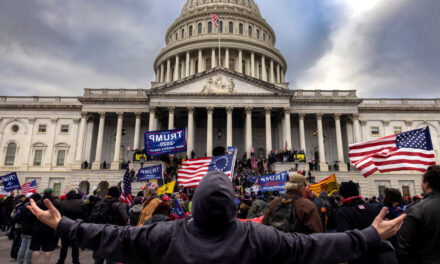Gag orders are used in the U.S. and many other countries by courts to protect parties in civil or criminal cases, including judges, lawyers, staff, jurors, witnesses, and jurors. They are also used to protect companies, governmental entities, NGOs, individuals, the integrity of ongoing police or military operations, the privacy of crime victims, minors, witnesses, and to prevent release of information that would jeopardize fair trials.[1] They come in many forms and venues. National security letters are administrative subpoenas issued by the FBI and often include gag orders restricting the recipients from revealing they have been served.[2]
While little known, they are allowed by federal statutes where “suspicious activity” is reported.[3] Dozens of federal statutes have built-in gag orders restricting what individuals can say in public or via social media outlets. One small example of obscure gag orders involves the Housing and Community Development Act of 1992, known as the Annunzio-Wilie Anti-Money Laundering Act. Gag orders are also embedded in the federal Electronic Communications Privacy Act, known as the Stored Communications Act.
Famous trials in American history included all kinds of gag orders, including the trials of people at Guantanamo Bay. In civil matters, they were used to protect discussion of evidence.[4] The California Electronic Communications Privacy Act, allows the use of court orders that delay notification and prohibit any party from revealing that electronic search warrants have been requested by a governmental entity.[5]
In the 1830s the U.S. House of Representatives used its “gag rule” to prohibit discussions and debates of anti-slavery petitions, including the receipt of over 130,000 petitions from citizens demanding the abolition of slavery in Washington D.C., and other federally controlled territories.[6]
By way of overstatement, American lawyers and judges have used, promoted, denied, favored, disfavored, and argued for and against gag orders for two centuries. Most of the debate typically involves gag orders on media in violation of the doctrine of past restraint. “In First Amendment law, prior restraint is government action that prohibits speech or other expression before the speech happens. Prior restraint typically involves statutes or regulations that require a speaker to acquire a permit or license before speaking. Prior restraint can also be a judicial injunction that prohibits certain speech. . . There is a third way, in which the government outright prohibits a certain type of speech. Courts typically disfavor prior restraint and often find it to be unconstitutional.”[7]
While prior restraint is enormously important when courts try to silence media, its vigor wanes when courts are asked to issue orders restraining out-of-court statements by defendants and their lawyers in criminal cases. Generally, defendants cannot talk about their cases to the media or other public entities when there is a gag order in place. Gag orders are often issued in criminal cases where extensive media coverage is likely. This includes defendants, their lawyers, witnesses, and even the judge and jury. The purpose of a gag order is to protect the right to a fair trial by preventing the dissemination of information that could prejudice potential jurors.[8]
The 2011 Michael Jackson molestation case included a gag order issued by the judge prohibiting Jackson, his accusers, and the lawyers in the case from publicly commenting to media in the case.[9] Other well-known gag-order cases include infamous defendants like Timothy McVeigh, the Oklahoma City bomber, and the civil case against O.J. Simpson. If a defendant violates a gag order, they can be held in contempt of court and fined or jailed.
At least preliminarily, former President Trump was told to “watch his words,” at his arraignment in his April 8, 2023, 34-count felony case against him in New York City. It was not a formal “gag order.”[10] But he was ordered by the judge not to speak directly with potential witnesses in all four of his pending criminal cases.
Predictably, the prosecutor in Trump’s January 6 case asked the trial judge to bar his “inflammatory attacks on case participants, citing a threat of violence and intimidation of jurors and others.”[11] They made the request on September 25, 2023, because on September 15, 2023, Trump publicly called the prosecutor “a deranged person who wants to take away my rights under the First Amendment.” The prosecutors had earlier warned U.S. District Judge Tanya Chutkan to stop Trump from “sowing lies that prompted violence and undermined democracy after the 2020 election.” Their request asks Judge Chutkan to bar Trump from “attacking participants in this case, discussing potential witnesses’ testimony or credibility beyond what his defense says in court or in filings and surveying D.C. residents in the potential jury pool without prior court approval of questions to prevent the risk of bias.”
The larger context of Trump’s media campaign against the court, judges, and prosecutors is also playing out in Denver, Colorado. The State of Colorado filed a suit that seeks to block him from the 2024 presidential ballot because he is “ineligible for office under the U.S. Constitution’s 14th amendment.” In her order, “District Judge Sarah B. Wallace prohibited all parties or their lawyers from actions that could be construed as threatening, intimidating, or harassing or that could be construed as attempting to coerce other parties or witnesses in the case or cause them to fear for their safety.”[12]
The Colorado Judge said she had concerns for the “safety for the parties, for the lawyers and frankly for myself and my staff, based on what we’ve seen in other cases.” After special counsel Jack Smith in June filed an indictment against Trump for alleged crimes around Jan. 6, Trump responded on Truth Social, “If you go after me, I’m coming after you!” which prosecutors viewed as “inflammatory” and “intimidating.” At issue in the Colorado case is a line in the 14th Amendment, ratified three years after the Civil War, to block from office any public official who had “engaged in insurrection or rebellion” — intended to prevent traitorous former Confederates from regaining power. [13]
A 2000 case somewhat mirrors the gag order that Trump may soon face. In United States v. Brown, the defendant, James Harvey Brown, was an elected state officer in Louisiana. He was indicted in a federal indictment that included the Governor of Louisiana. In his case, the trial court judge sua sponte entered a gag order that prohibits attorneys, parties, or witnesses from discussing with “any public communications media” anything about the case “which could interfere with a fair trial,” including statements “intended to influence public opinion regarding the merits of this case,” with exceptions for matters of public record and matters such as assertions of innocence. The district court denied Brown’s motion to vacate or modify the gag order, and Brown appealed. The United States Court of Appeals for the Fifth Circuit affirmed the lower court’s ruling and allowed the gag order to be enforced.[14] In their motion, prosecutors also cited an appeals court ruling in 2000 that involved a rare example of a defendant who challenged a gag order. A judge had prevented all trial participants from making statements outside the court “intended to influence public opinion” about the case’s merits, and the defendant, an elected insurance commissioner in Louisiana named Jim Brown, wanted to be exempted. But the appeals court upheld it.
This blog is not about the cases cited above or the reporting of them in the media. It is about the ethicality of writing about them. “Journalistic ethics and standards comprise principles of ethics and good practice applicable to journalists. This subset of media ethics is known as journalism’s professional ‘code of ethics’ and the ‘canons of journalism.’ The basic codes and canons commonly appear in statements by professional journalism associations and individual print, broadcast, and online news organizations. Around 400 codes cover journalistic work around the world. While various codes may differ in the detail of their content and come from different cultural traditions, most share common elements including the principles of truthfulness, accuracy and fact-based communications, independence, objectivity, impartiality, fairness, respect for others and public accountability, as these apply to the gathering, editing and dissemination of newsworthy information to the public. Like many broader ethical systems, the ethics of journalism include the principle of ‘limitation of harm.’[15]
Journalists have well-defined ethical parameters. Arguably, the best example is the Society of Professional Journalists’ Code of Ethics. Its preamble is high-minded. “Members of the Society of Professional Journalists believe that public enlightenment is the forerunner of justice and the foundation of democracy. Ethical journalism strives to ensure the free exchange of information that is accurate, fair, and thorough. An ethical journalist acts with integrity.”[16] The preamble is supported by four ethical principles: (1) Seek Truth and Report It. (2) Minimize Harm. (3) Act Independently. (4) Be Accountable and Transparent.
For lawyers, both prosecutors and defense lawyers there are also well-defined, high-minded ethical mandates. The ABA Rules of Professional Responsibility speak directly to the gag orders discussed above. Rule 3.1 governs what lawyers must do vis-à-vis claims and contentions in litigation. “A lawyer shall not bring or defend a proceeding, or assert or controvert an issue therein, unless there is a basis in law and fact for doing so that is not frivolous, which includes a good faith argument for an extension, modification, or reversal of existing law. A lawyer for the defendant in a criminal proceeding, or the respondent in a proceeding that could result in incarceration, may nevertheless so defend the proceeding as to require that every element of the case be established.”[17]
Judges in the federal system are ethically bound to abide by a code of conduct. Canon 3 of that code says, “A judge should perform the duties of office fairly, impartially, and diligently. A judge should not make public comment on the merits of a matter pending or impending in any court. A judge should require similar restraint by court personnel subject to the judge’s direction and control. The prohibition on public comment on the merits does not extend to public statements made in the course of the judge’s official duties, to explanations of court procedures, or to scholarly presentations made for purposes of legal education.”[18]
It seems clear, as of late September 2023, that judges, prosecutors, and defense lawyers are abiding by their respective codes of ethical conduct. However, no code binds former presidents once they leave office. Reportedly, former president Trump has inverted the U.S. government’s ethical conduct standards. “The president’s sliding scale of less ethics compliance being required the higher an official’s position is completely inapposite to the Standards of Ethical Conduct for Employees of the Executive Branch.”[19]
Ethics is, at its core, an effort to define morality. Morality is a set of principles that clearly define right and wrong and good or bad behavior. Embedded in the notion is the differentiation of intentions, decisions, and actions between those that are distinguished as proper, right, and improper, wrong. Morality can be a body of standards or principles derived from a code of conduct from a particular philosophy, religion, or culture, or it can derive from a standard that a person believes should be universal. Morality may also be specifically synonymous with “goodness” or “rightness.”[20]
It seems likely that the esoteric notion of morality will be lost in the political vacuum that dominates America today. For sure, many politicians value their ethical reputations and have lived a life of adherence to ethical practices and norms. But there are just as many in want of ethics, much less decorum and honest expression. The gag orders issued to the former president will likely be ignored, then litigated, then appealed to the only court in America without a code of ethics—the United States Supreme Court. But it has a long history of overturning gag orders on the media. Its ruling on gagging a former president will be sui generis.
[1] https://en.wikipedia.org/wiki/Gag_order
[2] 18 U.S.C. &2709.
[3] 31 U.S.C. &5318(G)(2)
[4] Goldenberg, Suzanne (5 August 2013). “Children given lifelong ban on talking about fracking”. The Guardian. Retrieved 6 August 2013.
[5] “CA Penal Code § 1546.2 (2017)”. Onecle Inc. State of California. 2017. Retrieved 26 May 2020.
[6] https://www.visitthecapitol.gov/sites/default/files/documents/lesson-plan/gag-rule.pdf
[7] https://www.law.cornell.edu/wex/prior_restraint
[8] https://www.quora.com/Can-anyone-use-a-gag-order-within-legal-matters
[9] https://en.wikipedia.org/wiki/Trial_of_Michael_Jackson
[10] https://www.npr.org/2023/04/08/1168295698/gag-order-trump
[11] https://www.washingtonpost.com/dc-md-va/2023/09/25/trump-gag-order-response
[12] https://www.washingtonpost.com/dc-md-va/2023/09/25/trump-gag-order-response/
[13] https://coloradonewsline.com/2023/09/22/potential-for-threats-from-trump-in-14th-amendment-case-sways-colorado-judge/
[14] U.S. v. Brown, 259 F.3rd 907 (2000)
[15] https://en.wikipedia.org/wiki/Journalism_ethics_and_standards
[16] https://www.spj.org/ethicscode.asp
[17] https://www.americanbar.org/groups/professional_responsibility/publications/model_rules_of_professional_conduct/rule_3_1_meritorious_claims_contentions/
[18] https://www.uscourts.gov/judges-judgeships/code-conduct-united-states-judges
[19]https://www.justsecurity.org/70367/the-presidents-inversion-of-the-governments-ethical-conduct-standards-right-before-americans-eyes/
[20] https://en.wikipedia.org/wiki/Morality

I am an author and a part-time lawyer with a focus on ethics and professional discipline. I teach creative writing and ethics to law students at Arizona State University. Read my bio.
If you have an important story you want told, you can commission me to write it for you. Learn how.






 I am an author and a part-time lawyer with a focus on ethics and professional discipline. I teach creative writing and ethics to law students at Arizona State University.
I am an author and a part-time lawyer with a focus on ethics and professional discipline. I teach creative writing and ethics to law students at Arizona State University.  My latest novel is Hide & Be.
My latest novel is Hide & Be.  If you have an important story you want told, you can commission me to write it for you.
If you have an important story you want told, you can commission me to write it for you.